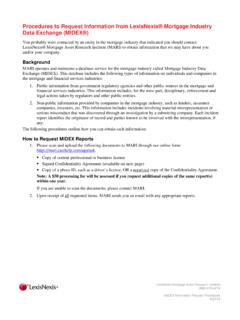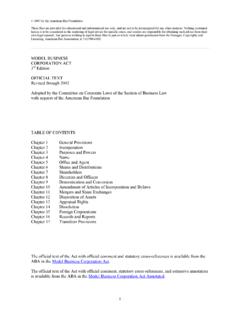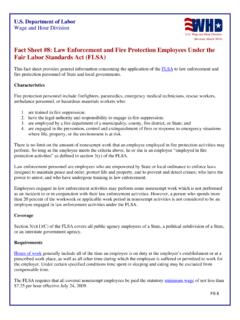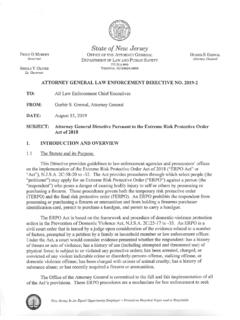Transcription of The Implied Covenant of Good Faith and Fair Dealing
1 The Implied Covenant of Good Faith and fair DealingGo to: Recognition of the Duty of Good Faith and fair Dealing | Application of the Covenant of Good Faith and fair Dealing | Drafting Contract Terms to Address the Covenant | Related ContentReviewed on: 05/23/2019It is well established that every contract has an Implied Covenant of good Faith and fair Dealing with respect to the parties performance and enforcement of the agreement. The Covenant imposes an obligation on parties to act in good Faith and deal fairly with other parties to the contract, even though this duty is not specifically stated in the contracts, especially complex agreements, cannot address every conceivable scenario nor provide detailed terms regarding every aspect of each party s obligations.
2 Performance may entail or necessitate actions that are not expressly set forth in the agreement and/or involve discretion on a party as to how to go about performing its obligations. The Implied Covenant of good Faith and fair Dealing prevents parties from exercising discretion and performing their contractual obligations in bad Faith and in a manner that denies the other party the benefit of its bargain. The Covenant can provide judges with a legal basis to fill gaps that may exist in contracts, as well as to restrict unreasonable or bad Faith performance of contractual obligations when warranted by the its broad application to all contracts, the meaning of and requirements imposed by the Implied Covenant of good Faith and fair Dealing are often not adequately understood by parties to commercial agreements.
3 Counsel must therefore properly address the issue when preparing or reviewing contracts for their clients, as well as ensure that clients understand what the Covenant requires when performing their agreements to avoid any practice note will examine how the Implied Covenant of good Faith and fair Dealing applies to contracts, the obligations created by the Covenant for contracting parties, how the courts have addressed the Covenant , and issues that counsel should consider when drafting commercial more information on Implied covenants, see Commercial Agreement Representations, Warranties, Covenants, Rights, and Conditions, Warranty and Disclaimer of Warranty Drafting, and Representations and Warranties of the Duty of Good Faith and fair DealingThe Implied Covenant of good Faith and fair Dealing has been recognized by the courts for over 80 years.
4 When it was first defined as a Covenant that neither party shall do anything which will have the effect of destroying or injuring the right of the other party to receive the fruits of the contract. This early definition remains the general standard that is still applied today. The Covenant is closely tied to upholding the reasonable expectations of the parties to a contract, and imposes minimal good Faith requirements for performance by the parties. The courts have employed the Covenant to prohibit a party from acting arbitrarily or unreasonably in a manner that frustrates the other party s reasonable expectations and benefit of the bargain.
5 Pursuant to the Covenant , a party must act in a way that is honest and faithful to the agreed purposes of the contract. A party must not act in bad Faith , dishonestly, or with improper motive designed to destroy or injure the other party s right to receive the benefits or reasonable expectations of the contract. If discretion is exercised in a manner not contemplated by the parties, the party exercising such discretionary power may be deemed to have performed in bad Faith . Thus, a party must exercise discretion within the reasonable expectations of the other party or else be at risk of violating the Covenant of good Faith and fair Dealing .
6 An The Implied Covenant of Good Faith and fair Dealinginsurance carrier may be found to have acted in bad Faith in violation of the Covenant when denying a claim under an insurance policy when it conducts an inadequate investigation of the claim or fails to seek or consider evidence relevant to the merits of the fact that a party may have a contractual right to use its sole discretion when determining whether to proceed with or terminate a contract will not always insulate the terminating party, as its actions may be limited by the Covenant of good Faith and fair Dealing .
7 For example, if a financing agreement permits the lender to terminate the contract in its sole discretion if it finds an environmental study on the property unacceptable, it could breach the Covenant if it attempts to terminate the agreement where the study did not find any problems with the property. In addition to performance, the Covenant also applies to a party s enforcement of an agreement. Good Faith in enforcement applies to a party s assertion, litigation, and resolution of contract claims and defenses relating to the agreement, and will be violated by dishonest conduct.
8 Accordingly, a party may not conjure up a nonexistent dispute, assert interpretations of an agreement that are contrary to its understanding, or falsify facts. In certain cases, the Covenant can apply to actions that, while on the surface appear fair , defeat the intent and spirit of the agreement. It also extends to dealings which, although candid, are unfair, such as taking advantage of the other party s circumstances to force a modification of a contract without any legitimate business that has been held to violate the Covenant include making harassing demands for assurances of performance, rejecting performance for unstated reasons, abusing discretionary power, intentionally failing to mitigate damages.
9 And acting in an arbitrary or unreasonable fashion when determining the other party s compliance with the contract or terminating the addition to judicial recognition, similar variations of the Covenant of good Faith and fair Dealing have also been recognized and adopted in the Uniform Commercial Code (UCC) and the Restatement (Second) of Uniform Commercial CodeThe UCC provides that every contract or duty within the UCC imposes an obligation of good Faith in its performance and enforcement . UCC 1-304. The UCC recognizes that the basic principle of good Faith runs throughout the UCC, and mandates good Faith in the performance and enforcement of all agreements.
10 Such duty generally applies to every contract within the UCC, even though only certain UCC sections expressly refer to an obligation of good Faith . While such an obligation does not provide the basis for an independent cause of action under the UCC, a failure to perform or enforce a contact or any contractual duty or obligation in good Faith constitutes a breach of contract. Pursuant to the UCC s general definitions, good Faith is defined as honesty in fact and the observance of reasonable commercial standards of fair Dealing .


















